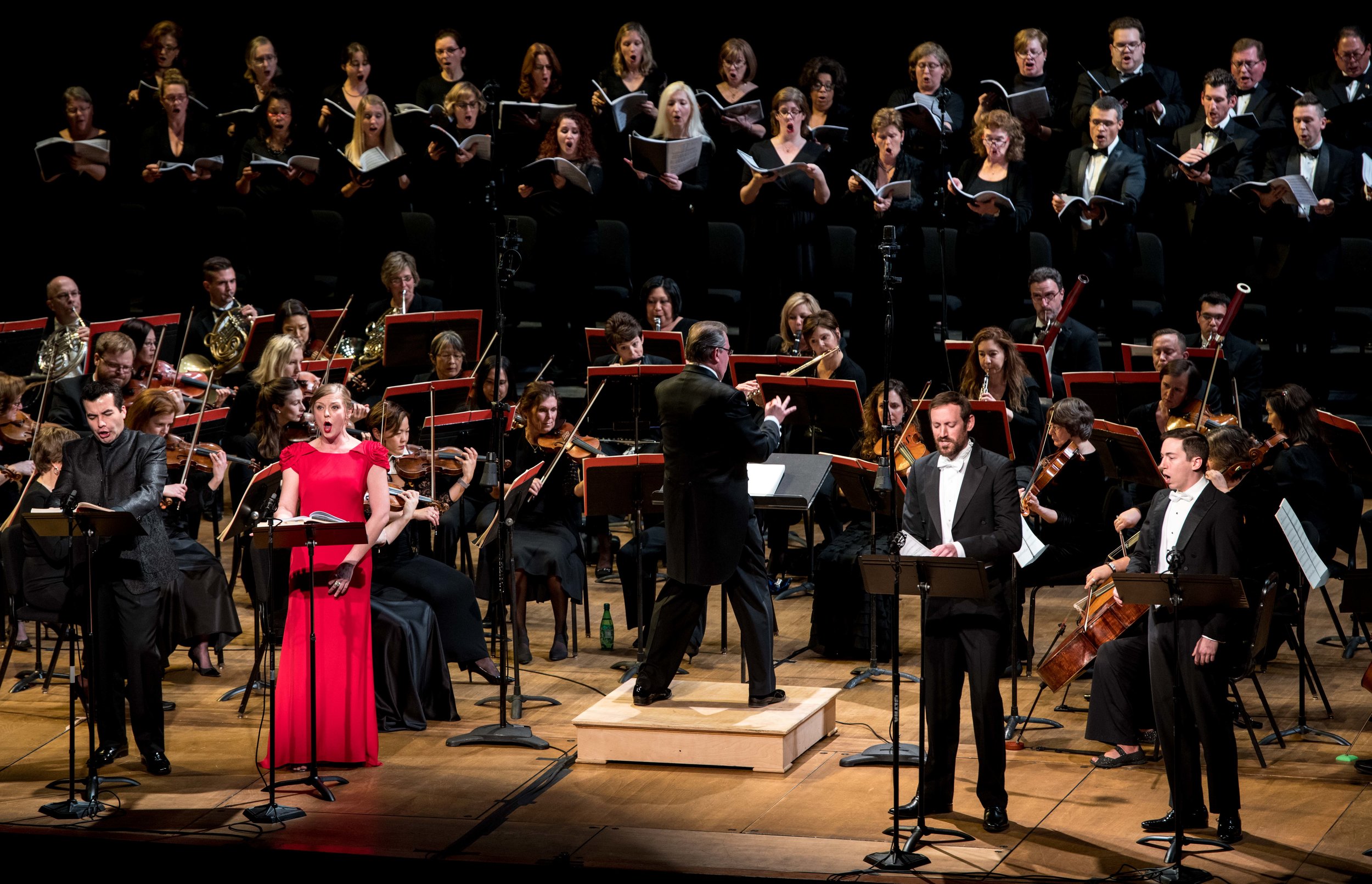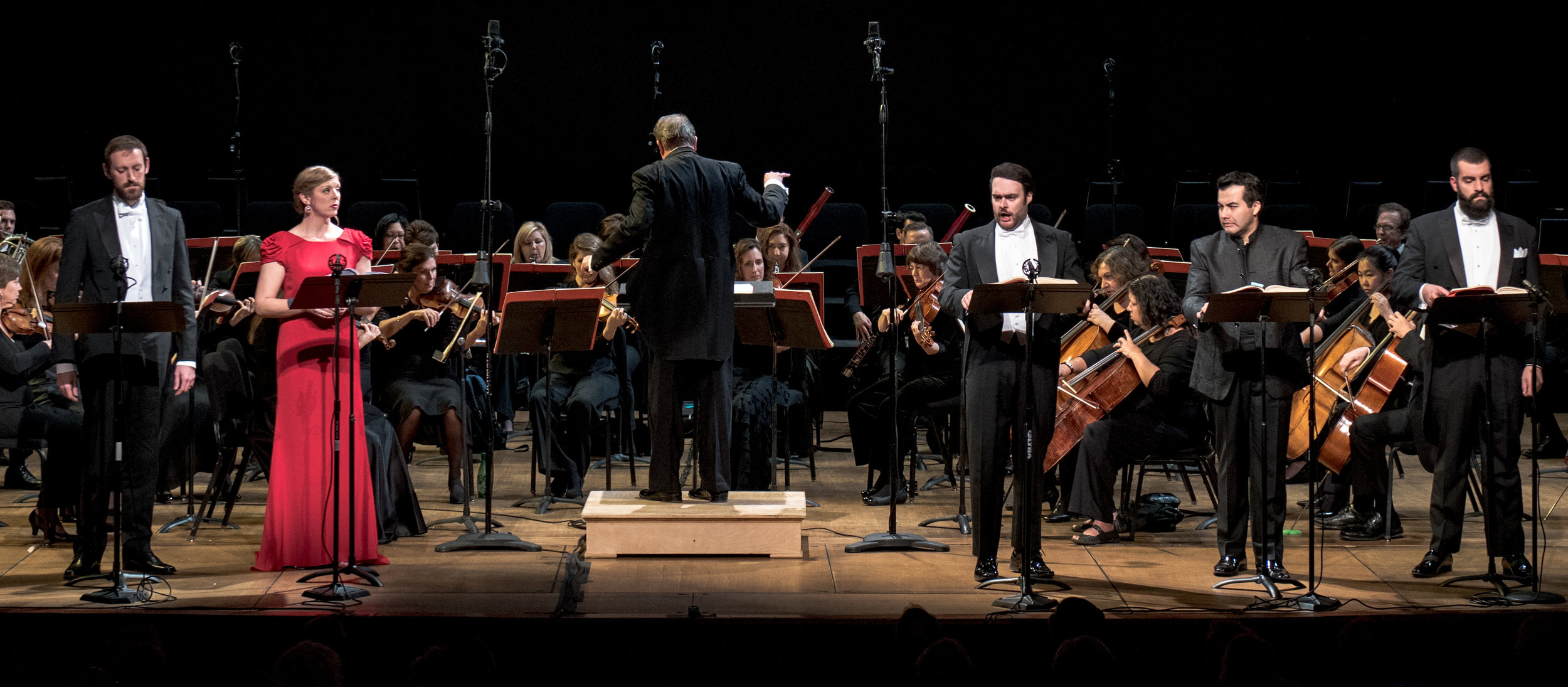WCO logo; courtesy of Washington Concert Opera.
Opera cognoscenti have long known about the joys of concert opera. I’m a recent convert. Last year the Washington Concert Opera’s performance of Leonore, Beethoven’s earlier version of Fidelio, was my first concert opera; it turned out to be one of my top two or three performances of the opera season. I followed up with a couple of trips over to see productions of the Baltimore Concert Opera; again excellent experiences. I now have no hesitation about attending concert opera.
There were two additional reasons I was looking forward to La Straniera (1829), WCO’s initial opera of the season. First, a highly talented young cast had been assembled, including a couple of Wolf Trap Opera alumni. Second, it’s Vincenzo Bellini, and a Bellini I haven’t heard of before. Who are the titans of bel canto (beautiful singing) Italian opera? Rossini, Donizetti, and Bellini. Bellini's Norma and I Puritani are staples of the classic repetoire. However, Bellini’s La Straniera, while successful in it day, is not often produced in the modern era. Washington Concert Opera does that - often presenting worthy operas that you are not going to see performed by the large opera companies. It’s refreshing, actually.
Henriette Meric-Lalande as Alaide in the original 1829 production of La Straniera. Image from public domain via Wikipedia.
This opera, when produced in modern times, has often been presented in concert. Why might this be? Let’s talk about the plot; it’s the standard boy meets girl; boy gets girl, and boy loses girl plot…but wait, it’s complicated…the boy (Arturo) is betrothed… the girl (Agnes) is married to the king…except the Pope ruled the king’s previous marriage still holds…so Agnes was sent into secret exile with her brother, Leopoldo, as guardian under assumed names…Agnes is now known to locals as Alaide or as the mysterious la straniera (the foreign woman), and her brother is known as Valdeburgo. So, boy with baggage meets girl with baggage; he falls hard and she is attracted to him, but resigned to her fate. Stuff happens along the way – Arturo, whose name should have been ‘Impetuous’, duels with the secret brother jealously thinking the brother is his rival. He wounds Valdeburgo, who falls into the lake. Then Alaide tells Arturo he has killed her brother; shocked, he jumps in the lake to attempt a rescue, leaving Alaide holding his bloody sword, which causes her to be blamed for Valdeburgo’s death. Well, the brother is not really dead and makes a surprise entrance at the trial. I will stop here, but there are even more plot twists to come involving Arturo’s betrothed (Isoletta) and the king’s new wife. In this performance of La Straniera, the surprise revelations along the way generated laughter in the audience, not the desired effect. True, opera plots are chosen for the range of emotions possible and not for simplicity or internal consistency, but La Straniera is over the top even for opera, especially for modern audiences. If you don’t want focus on the plot and you have great music to offer, voila – opera in concert, where the focus is on the music and the singing. By the way, if at this point you are holding out for a happy ending, read more Shakespeare; I did reveal that boy loses girl.
Javier Arrey as Valdeburgo, Gerald Schneider as Arturo, and Amanda Woodbury as Alaide. Photo by Don Lassell; courtesy of Washington Concert Opera.
It’s surprising to me that Bellini and librettist Felice Romani selected the novel, “L’Etrangere” by Charles-Victor Prevost D’Arlincourt (1825), for deriving a plot this complicated. Romani is one of Italian opera’s most famous librettists. It was a very popular novel of its day and spawned a number of plays. I guess the times were different then, although frankly, I was not among those laughing at the revelations. I was able to suspend disbelief, required of all operas I think, and go with the Italian flow. When I was a young boy, I loved going to the movies on Saturday afternoon to see the latest western; it wasn’t serious involvement; it was just fun. I reacted to La Straniera the same way: I was transported to Italy at the opera on a Saturday afternoon in the nineteenth century and was digging it. Arturo’s love-struck impetuousness seemed perfectly normal to me.
Javier Arrey as Valdeburgo, Corrie Stallings as Isoletta, Matthew Scollin as Montolino, Jonas Hacker as Osburgo, Conductor Antony Walker, and the WCO Orchestra and Chorus. Photo by Don Lassell; courtesy of Washington Concert Opera.
Regardless, great music it is. Within two minutes of listening to the opening music, I knew I was going to enjoy this opera. WCO’s 54-piece orchestra under the direction of Antony Walker sounded great, and WCO has them on the stage behind the singers so the orchestra is in full view and the sound is more directly aligned to the audience. I previously heard Mr. Walker conduct for WCO, Wolftrap Opera, and the Pittsburgh Opera; I have yet to be disappointed, and I find his enthusiasm in conducting, fully visible in concert opera, to be infectious. The WCO Chorus sat directly behind the orchestra and performed well and often as Bellini makes full use of the chorus; kudos to the assistant conductor and chorus master, David Hanlon.
Matthew Scollin as Montolino, Corrie Stallings as Isoletta, Gerald Scheider as Arturo, Javier Arrey as Valdeburgo, and Timothy Bruno as the Prior. Photo by Don Lassell; courtesy of Washington Concert Opera.
There is legitimate drama in La Staniera. The singers sang in character, conveying the emotions required by the plot and supported by the music. Though not fully staged, this is storytelling at a very high level. And the singers – oh my gosh, it was one beautiful voice after another. Let’s start with soprano Amanda Woodbury, our Alaide. I love it when a soprano has a voice that is so easy on the ears; her voice is honey. She is the 2014 winner of the Metropolitan Opera National Council Auditions and the second place awardee in the international Operalia competition that year. Even being under the weather, she sang with convincing emotion and ample power. Her love interest, Arturo, was sung by tenor Gerard Schneider. He has borne some criticism in the professional reviews for an inconsistent performance. Even to my untrained ear, he seemed a bit off on occasion. However, the Saturday afternoon movie-goer in me looked past that to enjoy the way he embodied the role of the smitten and hot-headed young Arturo. And, Mr. Schneider has such a beautiful metallic tenor tone that he was sometimes thrilling. Javier Arrey, with a gorgeous even baritone, is a rising star and was the smooth operator for the evening, playing Valdeburgo with passion and consistency. Perhaps, the surprise performance for me was mezzo-soprano Corrie Stallings who played Isoletta. My appreciation for mezzos has grown recently and she was outstanding, on stage far too little for my preferences. Bass-baritone Matthew Scollin as Montolino was an impressive father figure for Isoletta; he is a resident artist for the Pittsburg Opera. Two of my favorites from their Wolftrap Opera days were tenor Jonas Hacker who played Arturo’s friend and bass Timothy Bruno who played the Prior. Mr. Hacker is a fine young tenor and it was fun to hear Mr. Bruno’s deep bass once more; I very much enjoyed their performances with WTO and hold them in high regard. The cast overall, in both individual arias and ensemble pieces, provided beautiful voices and beautiful singing to make for as an enjoyable evening as you are likely to have at the opera.
If you haven’t been to a concert opera, what can I say to get you to give it a try? A few years ago, I offered to buy my wife an iPad. Nope, didn’t want one. I bought one for her as a surprise gift anyway. Now, the iPad goes wherever she goes (she’s getting an upgrade for Christmas – she knows) and she told me recently that she’s a digital girl. Sometimes you don’t know what you are missing until you give it a try (my apologies to Yogi Berra). Really, if you love opera and you are not attending opera in concert, you are missing some great fun. Who knows? You might be a WCO girl, or guy.
The Fan Experience: The WCO performs in Lisner Auditorium on the campus of George Washinton University. There is a parking deck close to Lisner with typical DC rates, but on Sunday evening parking restrictions are lifted for most of the on street parking in the area which is free at that time; I managed to scarf a spot. In general for Lisner, I recommend being as close to the center of the auditorium as possible for the best sound. I was seated close to the stage slightly off center for the first act and got the full immersive experience of being so close. At intermission, I took an unoccupied seat in the back right rear of the auditorium to see how the sound compared with being close (changing seats is bad opera etiquette, but this was for the cause). The stereophonic sound that comes from being really close was diminished, but on the other hand, the volume of sound was quite good and the balance of sound was noticeably better farther back. The voices carry extremely well in Lisner. So, take your choice. Program credits were offered for Dorothy and Ken Woodcock who made the performance possible through support of the WCO 2017-2018 season, and Ed and Andy Smith for support of Mr. Hacker, and The Guild for Washington Concert Opera for support of Ms. Woodbury and Mr. Arrey. A downside for WCO offerings is that you only get one shot, one and done for each production. The next WCO production is Donizetti’s Maria Di Rohan on February 18. Tickets range from $40-100 and $15 for students. The better seats are selling out, so purchase your seat as quickly as you can.





